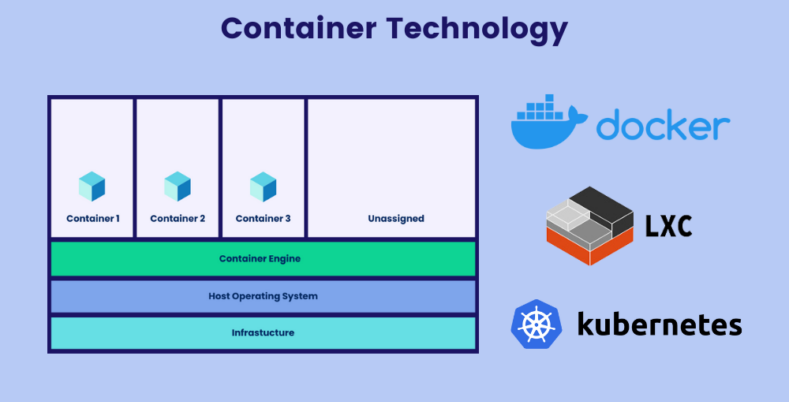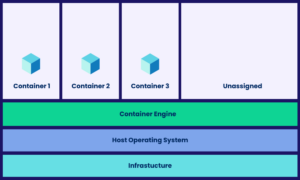The software development realm is nothing short of innovations and technological shifts. Amidst all this, containers have evolved as powerful tools for streamlining and improving the software development and deployment process. Let’s take the example of a shipping container, wherein all the goods are packed well to protect them during transportation.
The workings of containers are similar! Containers are all about packaging an application and its dependencies in a standalone unit that can run effectively and consistently across different computing environments.
This blog will help us understand more about containers. So, without any further ado, let’s get started.
What Are Containers?
Containers are lightweight, standalone, and executable units of software packages that help run any application with its libraries, code, runtime, and more. With containers, you can run code in any computing environment, be it traditional IT, cloud infrastructure, or desktop.
Unlike traditional virtual machines (VMs), containers share the host system’s kernel and isolate application processes from other systems, making them faster than ever.
What are the Types of Container Technology?
Some of the popular containerization technologies are as follows:
Docker:
Docker, also known as Docker Engine, is an open-source container runtime that lets developers easily build and deploy applications on different platforms. Docker containers are generally created with Docker containers.
Linux:
Thanks to Linux containers and self-contained environments, a single host computer can run multiple Linux-based applications. Software developers use Linux containers to run programs that write or read massive volumes of data.
Kubernetes:
Kubernetes, a potent container orchestration platform, fully automates the deployment, scaling, and management of containerized apps. It offers strong features like load balancing, self-healing, and automated rollouts and rollbacks to ensure high availability and dependability.
Kubernetes simplifies complex operations by abstracting the underlying infrastructure, freeing developers to concentrate on creating and delivering applications.
What are the Key Components of Containers?
Container Images
Containers are created from images containing the application code, libraries, and dependencies.
Container Runtimes
The container runtime software is required to execute containers on the host operating system.
Container Engine
The overall container management system comprises the runtime and extra tools and services. One popular container engine is Docker.
Orchestration of Containers
Platforms and tools for managing container networking, scaling, and deployment. Platforms for container orchestration include Kubernetes, Docker Swarm, and more.
Benefits of Containers
Containers offer numerous benefits to modern software development and thus have become the ideal choice in this industry.
Lightweight
Because containers share the OS kernel, they don't need an entire OS instance for each application and are small, requiring fewer resources and less space. Since containers are smaller than VMs, they can spin up quickly and support cloud-native applications that scale horizontally.
Rapid Deployment
Containers can deploy in seconds, unlike VMs, which might take hours to provision. This breakthrough speed not only boosts development efficiency but also allows faster development and meeting business needs as they arise.
Scalability
Another key benefit of containers is that they can be scaled up or down quickly to handle varied workloads. Additionally, orchestration tools like Kubernetes simplify the scaling process by automating it on demand.
Portability
Containers can virtually run anywhere, on Linux, Windows, and Mac OS, or even physical servers, the public cloud, or a developer's machine. This greatly eases working portability.
Security
Containers excel in terms of security, too. They provide a highly efficient way to isolate applications and processes, making it difficult for hackers and identity thieves to access the network.
Use Cases of Containers
Below are some of the widespread use cases of containers.
Generative AI
The industry’s most talked-about topic is generative AI. The point is that containers offer the best way to deploy and manage the large language models (LLM) associated with generative AI, offering scalability and portability when used with orchestration tools.
Hybrid and multi-cloud
As containers can run anytime, anywhere, across on-premises and cloud environments, they are crucial as an ideal architecture for multi-cloud and hybrid cloud scenarios.
Microservices
If you’re trying to build a microservices architecture, containers form the suitable deployment unit for every microservice and network that connects them.
Agile Development
Containers let developers move quickly by avoiding any hassles related to dependencies and environments.
Containers vs Virtual Machines: The Comparison
While both containers and virtual machines (VMs) offer isolation, here are the key differences:
| Feature | Containers | Virtual Machines |
| Resource | Low | High |
| Boot Time | Fast | Slow |
| Isolation | Extreme | Extreme |
The Challenges:
Security: Even though containers offer isolation, security issues can affect them. Thus, it's paramount to abide by best practices, which include runtime security implementation, frequent image updates, and more.
Networking: When you’re working on large-scale deployments, container networking can be a tough job. Effective management of container networking can be achieved with the help of different tools like Kubernetes.
Storage: As containers are transient by nature, their storage needs to be done momentarily. Stateful apps that survive beyond the container's lifecycle need persistent storage solutions.
Management Overhead: As the number of containers rises, managing them can become more challenging. Kubernetes and other container orchestration tools help manage this complexity despite having their learning curve.
Digging the Final Lines
Software development is a vast field, and containers play a vital role in developing, testing, and deploying applications. With a range of benefits such as agility, scalability, efficiency, and more, containers are a go-to in software development projects.
Hope this blog has covered all the techie insights on containers. Whether you’re new to the tech world or a seasoned developer, this guide can ultimately clear your doubts!
Read More: Virtual Reality History: Complete Timeline Explained






